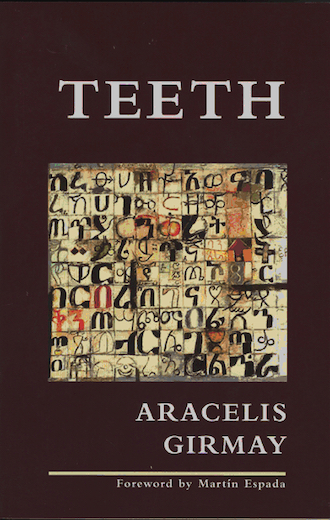I first encountered this poem in my early twenties, when I had just started to consciously write poems. It was a very difficult time in my life — I was a young mother juggling several precarious jobs and still grieving the loss of my father and separation from my community as a result of my decision to raise my child on my own. I was living like a ghost. And this was a poem that brought me back to the world, reminding me of what was at stake in our willingness to remain engaged, to be generous with our attention, even when it seemed like the best thing to do was opt out. In this poem, Girmay conjures litany as means to connect, insistently, to and in the face of loss. As a form, it hinges on the tension between repetition and transformation, between closure and inclusiveness. It mirrors the way one might go about breaking a wall or learning to love.
“Arroz Poetica” begins with a proposition from the speaker’s friend “that all people against the war should / send a bag of rice to George Bush,” and to write on the bag, “‘If your enemies are hungry, feed them.’” The ambiguous second person possessive here could either refer individually to Bush, or like a moral code, to humankind in general. Girmay, however, torques the ambiguity to implicate the speaker herself, forcing her to take a side in the conflict: “But to be perfectly clear, / my enemies are not hungry.” This rhetorical move, by repositioning the speaker as the poem’s historical agent — rather than Bush or anonymous humanity — (re)claims the right to define the enemies. In the poem’s second stanza, Girmay repeatedly uses “They” or “My enemies” at the start of each descriptive sentence, invoking the rhythm of a chant, to batter America’s image of Brown people far away, and replace it with those nearby who profit from war while living in comfort and security: “…My enemies eat / meats & vegetables at tables / in white houses… / They do not lose their houses & their streets. They do not / come home to find their lamps broken. /… / Their children are not made to walk / a field of mines, exploding.”
The clarity achieved by this act of redefinition primes the reader for the speaker’s decision in the third stanza: “I will not send George Bush rice, worked for rice / from my own kitchen…” and allows us to follow her shift in focus from the enemies to the Iraqi people. By taking the time to establish the degree of protection the privileged have, Girmay is able to create a powerful contrast as she inserts a catalogue of the harms suffered by the unacknowledged and the disappeared, the names America will not call:
“…Hassna
Ali Sabah, age 30, killed by a missile in Al-Bassra, or you,
Ibrahim Al-Yusuf, or the sons of Sa’id Shahish
on a farm outside of Baghdad, or Ibrahim, age 12,
as if your blood were any less red, as if the skins
that melted were any less skin, & the bones
that broke were any less bone,
as if your eradication were any less absolute, any less
eradication…”
Deftly balancing the specific and the immense; Girmay patiently catalogues the repetitive, granular gestures that make up ordinary human life — “& you will not ever walk home / again, or smell your mother’s hair again, / or shake the date palm tree / or smell the sea / or hear the people singing at your wedding / or become old / or dream or breathe, or even pray or whistle…” — inviting the reader to intimately experience loss beyond measure. The list of actions truncated, held in place by “or,” includes, expands, transforming eventually into boundless “morning, heart, father…”
In the poem’s final stanza, the speaker uses litany to clarify and cement her personal connection to the experiences of Iraqis under US occupation: “because your name is the name of my own brother, / because your name is the Tigrinya word for ‘tomorrow,’/ because all my life I have wanted a farm, / because my students are 12, because I remember / when my sisters were 12.” And through the closing of this distance between the “you” and the “I,” Girmay is able to take us through the description of a body’s destruction, which a bag of rice cannot reverse, nor a poem. “I cannot / imagine…” she writes, but then the poet must, and by extension, the reader. The poem ends not with resolution but with substitution: “…when I say ‘night.’ / it is your name I am calling.” In place of wholeness, Girmay invokes everywhereness, and it is this capacity to reach for what is irrecoverable that makes me return to her work over and over again.




